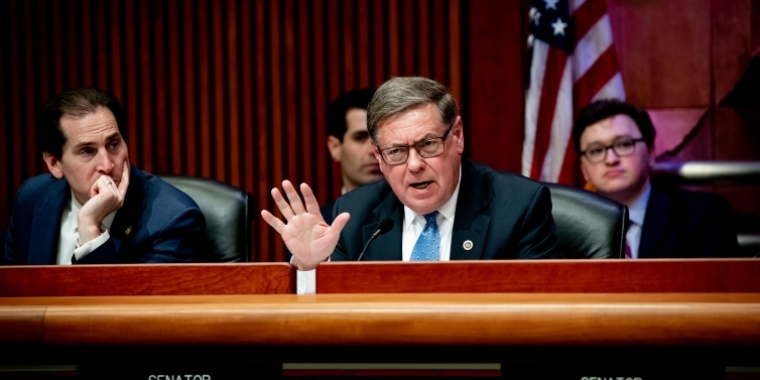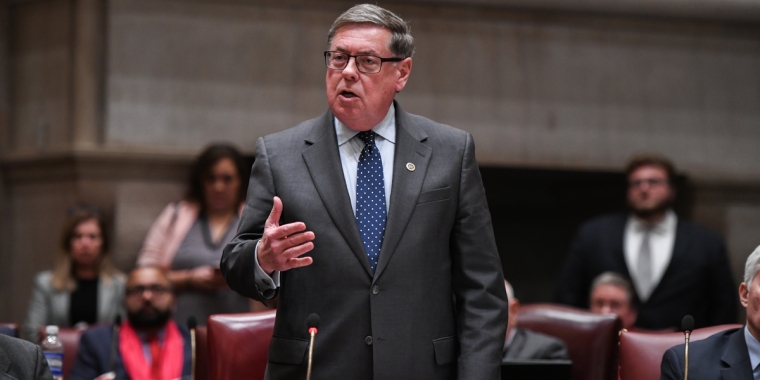
Seward Joins Senate in Continued Fight Against Heroin Addiction
Jeff Bishop, Communications Director
May 17, 2016
-
ISSUE:
- Heroin and Opioid Addiction
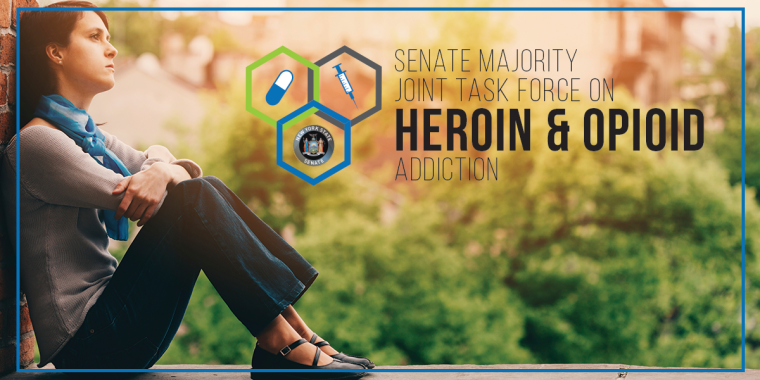
ALBANY, 05/17/16 -- State Senator James L. Seward (R/C/I – Oneonta) today announced the release of a special report from the Joint Senate Task Force on Heroin and Opioid Addiction. The report included 48 legislative and budgetary recommendations to help fight the heroin and opioid abuse epidemic. A bill sponsored by Senator Seward (S.2346) that would offer an incentive to employers who hire recovering addicts was part of the package.
“Heroin addiction devastates lives, families, and communities and it is vital that we continue to target this epidemic from all angles – prevention, treatment, recovery, and enforcement,” said Senator Seward. “My bill in particular, would help individuals in recovery as they take steps to rebuild their lives and overcome the stigma of drug addiction.”
Senator Seward has served on the Joint Senate Task Force on Heroin and Opioid Addiction since its inception in 2014 and has hosted two task force forums, including one in Oneonta earlier this year, to solicit input from local health care professionals, addiction experts, law enforcement officials, and concerned citizens.
“The senate task force has helped call attention to the heroin epidemic and a number of new laws have been enacted to improve treatment options, educate the public about this community scourge, and aid law enforcement officials. However, the tragedies continue so we cannot waver and must move forward with additional actions like those included in the senate report,” added Seward.
Senator Seward’s bill (S.2346) will provide a tax credit to employers who agree to hire individuals who have either graduated from drug court or have successfully complete a judicial diversion program.
“A job is more than just a paycheck for someone in recovery. It is a symbol of self-worth and a validation that others have confidence in your abilities. Employment is also a key incentive that will help motivate an addict to stay clean. By offering this tax credit, I am hopeful that more employers will show faith in individuals who have earned a second chance,” said Seward.
Overall, the senate report incorporates testimony and recommendations from nine forums held during 2015-16 to develop prevention, treatment, recovery, and enforcement initiatives.
“Heroin and opioid addiction is a public health crisis and no one is immune to the crippling effects of this epidemic. New laws already enacted are helping, but we continue to identify gaps in service and other needs that must be addressed. I am hopeful the assembly will join the senate and approve the lifesaving measures included in this special report before the end of the legislative session so they can be sent to the governor for his consideration,” Seward concluded.
-30-
The full report with detailed findings and recommendations can be found here.
A brief summary of the recommendations is below.
LEGISLATIVE RECOMMENDATIONS:
The Task Force incorporated the four essential prongs and collaborated with stakeholders in communities across the state as part of its strategy to develop the report’s legislative and budgetary recommendations. These recommendations create an effective, multi-faceted, and comprehensive approach to addressing many of the issues raised by the state’s opioid crisis.
The Task Force is recommending the following legislative actions for the Senate to consider during the 2016 legislative session and for state agencies to assist in implementing:
Prevention:
· Limiting initial prescriptions of controlled substances (S6091B, Hannon)
· Creating a Prescription Pain Medication Awareness Program (S4348A, Hannon)
· Enhancing patient access to abuse-deterrent technology for opioids (S6962A, Hannon)
· Ensuring proper opioid education to prescribed patients (S7315, Murphy, Amedore, Ortt);
· Establishing a Narcan kit registry (S6516A, Amedore);
· Providing instruction of mental health, alcohol, drug and tobacco use in junior and senior high schools (S5546A, Funke);
· Requiring patient counseling prior to issuing a prescription for a schedule II opioid (S7365, Akshar);
· Increasing availability of naloxone (S6346A, Carlucci); and
· Requiring the state Department of Health (DOH) and the state Office of Alcoholism and Substance Abuse Services (OASAS) to examine and report on the underreported and at-risk populations, including but not limited to Native American Tribes and the effect the heroin and opioid crisis is having on those populations.
Treatment:
· Continuing education for credentialed alcoholism and substance abuse counselors (S7301, Amedore, Murphy, Ortt);
· Removing barriers to Medication Assisted Treatment (MAT) (S7317A, Murphy, Amedore, Ortt);
· Examining insurance coverage for medications approved by the FDA for use in MAT of opioid addiction and examine the accessibility across the state to new treatment modalities;
· Enhancing emergency intervention procedures (S6248B, Ortt);
· Establishing assisted outpatient treatment for substance use disorders (S631, Carlucci);
· Requiring the DOH and OASAS to examine and report on the most effective treatment modalities, including ideal settings, treatment length, and best practices for heroin and opioid addiction;
· Creating and appointing an Ombudsman to assist individuals and families in obtaining appropriate insurance coverage for treatment services;
· Requiring all OASAS-certified treatment providers to inform individuals receiving treatment and their families of their right to file an external appeal with the Department of Financial Services (DFS) and provide them with the means necessary to access such appeal; and
· Requiring DOH and DFS to rigorously scrutinize the implementation of any conditions placed on accessing treatment.
Recovery:
· Including for-profit providers in the Request for Proposals Process for substance use disorder and gambling programs (S7446, Amedore);
· Creating a Sober Living Task Force (S3989A, Croci);
· Expanding treatment options for judicial diversion participants (S6874, Murphy);
· Expanding access to judicial diversion programs (S6322A, Ranzenhofer);
· Encouraging employment of recovering users (S2346, Seward);
· Enacting the Wraparound Services Demonstration Program (S7748A, Carlucci); and
· Requiring DOH and OASAS to examine and report on vital statistics related to heroin and opioid addiction, including relapse rate, length of treatment, and what, if any, follow up care supports are in place upon discharge.
Enforcement:
· Enhancing penalties for the sale of controlled substances on park grounds and playgrounds (S994, Golden) - this bill passed the Senate on March 1, 2016;
· Facilitating the conviction of drug dealers (S100, Boyle);
· Expanding the crime of operating as a major trafficker (S4177, Murphy);
· Creating Drug-Free Zones around drug or alcohol treatment centers and methadone clinics (S7200, Akshar);
· Establishing appropriate penalties as it relates to heroin sales (S7012, Ortt);
· Enhancing judicial access to juvenile records for determining judicial diversion program eligibility (S6317, DeFrancisco);
· Adding fentanyl to the controlled substance schedule (S6632A, Croci);
· Establishing Xylazine as a controlled substance (S7397, Murphy);
· Creating the crime of homicide by sale of an opioid controlled substance (S4163, Amedore); and
· Developing a formula to dispense funds acquired from the seizure of assets used in the commission of drug crimes.
BUDGETARY RECOMMENDATIONS:
The report highlighted this year’s state budget commitment of $166 million for heroin and opioid crisis, treatment, outpatient, and residential services. Due to advocacy by the Senate’s Task Force members, the budget included an increase of $25 million above the Executive Budget’s original proposal.
The report recommends that this additional $25 million would support: Family Support Navigator and Navigator training programs; On-Call Peer programs; Adolescent Clubhouses to provide safe and welcoming spaces for teens; Recovery Community and Outreach Centers; Recovery Coach peer mentoring programs; a “Combat Heroin” Public Service Campaign; Opioid Overdose Prevention program; Opioid Medication Treatment program; Transitional Housing Opportunities; Local Government Unit Block Grants; School Resource Officer Training programs; and a Wraparound Services Demonstration Program.
related legislation
Share this Article or Press Release
Newsroom
Go to NewsroomSeward Joins Senate Republicans to Unveil Job Creation Platform
February 27, 2019
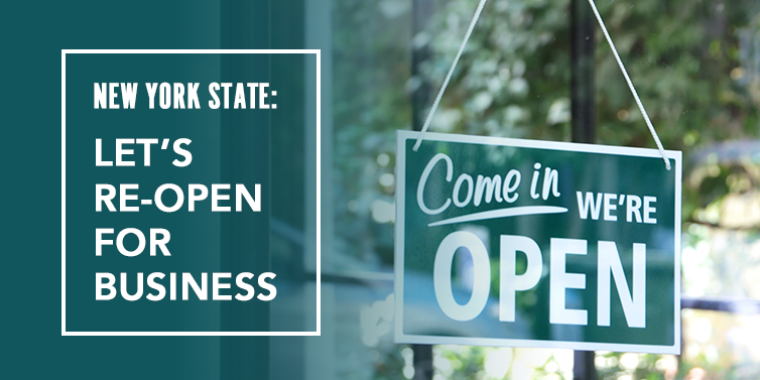
Seward Continues Push for Upstate Needs
February 12, 2019
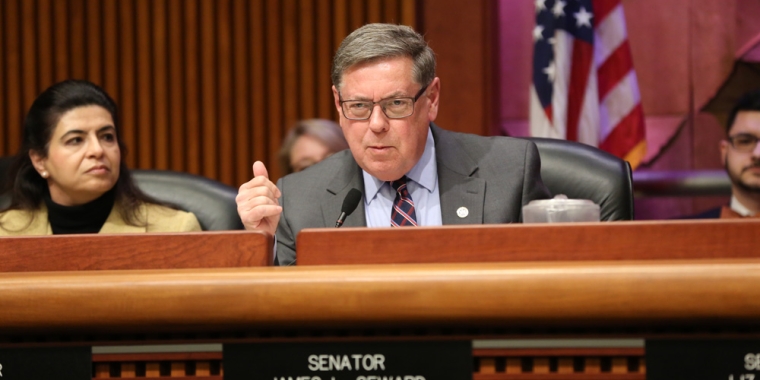
Frontier Follow-Up
February 12, 2019
